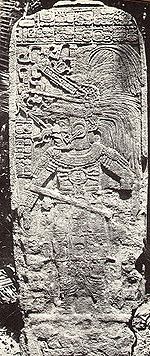
1908 in archaeology
Encyclopedia
The year 1908 in archaeology involved some significant events.


Excavations
- At AveburyAveburyAvebury is a Neolithic henge monument containing three stone circles which is located around the village of Avebury in Wiltshire, south west England. Unique amongst megalithic monuments, Avebury contains the largest stone circle in Europe, and is one of the best known prehistoric sites in Britain...
by Harold St George Gray. - First excavations at SamariaSamariaSamaria, or the Shomron is a term used for a mountainous region roughly corresponding to the northern part of the West Bank.- Etymology :...
begin by a HarvardHarvard UniversityHarvard University is a private Ivy League university located in Cambridge, Massachusetts, United States, established in 1636 by the Massachusetts legislature. Harvard is the oldest institution of higher learning in the United States and the first corporation chartered in the country...
expedition. - SakçagözüSakçagözüSakçagözü is a village in the Nurdağı of Gaziantep, Turkey. There are Hitite ruins in the village. Population was 3900 in 1999.The "Coba Tumulus" was first discovered in 1883 by Karl Humann and Felix von Luschan...
excavated by John GarstangJohn GarstangJohn Garstang was a British archaeologist of the ancient Near East, especially Anatolia and the southern Levant....
. - Ulugh Beg ObservatoryUlugh Beg ObservatoryThe Ulugh Beg Observatory is an observatory in Samarkand, Uzbekistan. Built in the 1420s by the Timurid astronomer Ulugh Beg, it is considered by scholars to have been one of the finest observatories in the Islamic world at the time and the largest in Central Asia before it was destroyed in 1449...
is discovered in SamarkandSamarkandAlthough a Persian-speaking region, it was not united politically with Iran most of the times between the disintegration of the Seleucid Empire and the Arab conquest . In the 6th century it was within the domain of the Turkic kingdom of the Göktürks.At the start of the 8th century Samarkand came...
by Russian archaeologist V. L. Vyatkin, which had been partly destroyed in 1449.
Publications
- A. Hadrian Allcroft - Earthwork of England: Prehistoric, Roman, Saxon, Danish, Norman, and Mediæval.
- Joseph Déchelette begins publishing his Manuel d'Archéologie Préhistorique, Celtique, et Gallo-romaine.
Finds
- Venus of WillendorfVenus of WillendorfThe Venus of Willendorf, also known as the Woman of Willendorf, is an high statuette of a female figure estimated to have been made between 24,000 and 22,000 BCE. It was discovered in 1908 by archaeologist Josef Szombathy at a paleolithic site near Willendorf, a village in Lower Austria near the...
found by Josef Szombath. - 3 July: Phaistos DiscPhaistos DiscThe Phaistos Disc is a disk of fired clay from the Minoan palace of Phaistos on the Greek island of Crete, possibly dating to the middle or late Minoan Bronze Age . It is about 15 cm in diameter and covered on both sides with a spiral of stamped symbols...
. - A 40,000-year-old Neandertal boy skeleton is found at Le MoustierLe MoustierLe Moustier is an archeological site consisting of two rock shelters in Peyzac-le-Moustier, Dordogne, France. It is known for a fossilized skull of the species Homo neanderthalensis that was discovered in 1909...
in southwest FranceFranceThe French Republic , The French Republic , The French Republic , (commonly known as France , is a unitary semi-presidential republic in Western Europe with several overseas territories and islands located on other continents and in the Indian, Pacific, and Atlantic oceans. Metropolitan France...
.
Births
- November 25: Jia LanpoJia LanpoJia Lanpo was a Chinese prehistorian. Professor Jia was one of the founders of Chinese anthropology.He graduated from the Huiwen Academy in 1929 and went on to work as a trainee at the Cenozoic Research Laboratory of the Geological Survey of China...
, ChineseChinaChinese civilization may refer to:* China for more general discussion of the country.* Chinese culture* Greater China, the transnational community of ethnic Chinese.* History of China* Sinosphere, the area historically affected by Chinese culture...
prehistorian - December 17: Willard Frank Libby, developer of radiocarbon datingRadiocarbon datingRadiocarbon dating is a radiometric dating method that uses the naturally occurring radioisotope carbon-14 to estimate the age of carbon-bearing materials up to about 58,000 to 62,000 years. Raw, i.e. uncalibrated, radiocarbon ages are usually reported in radiocarbon years "Before Present" ,...

